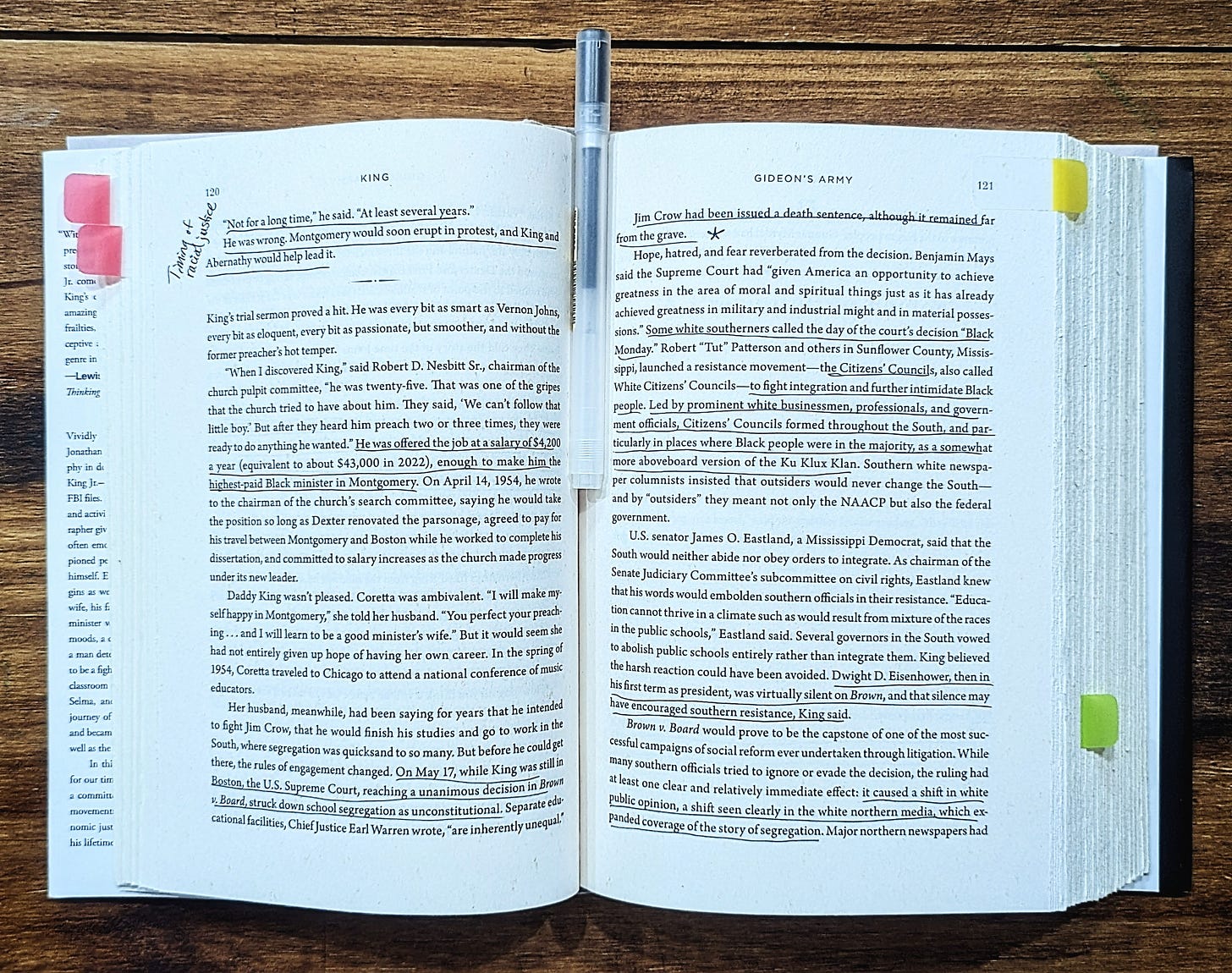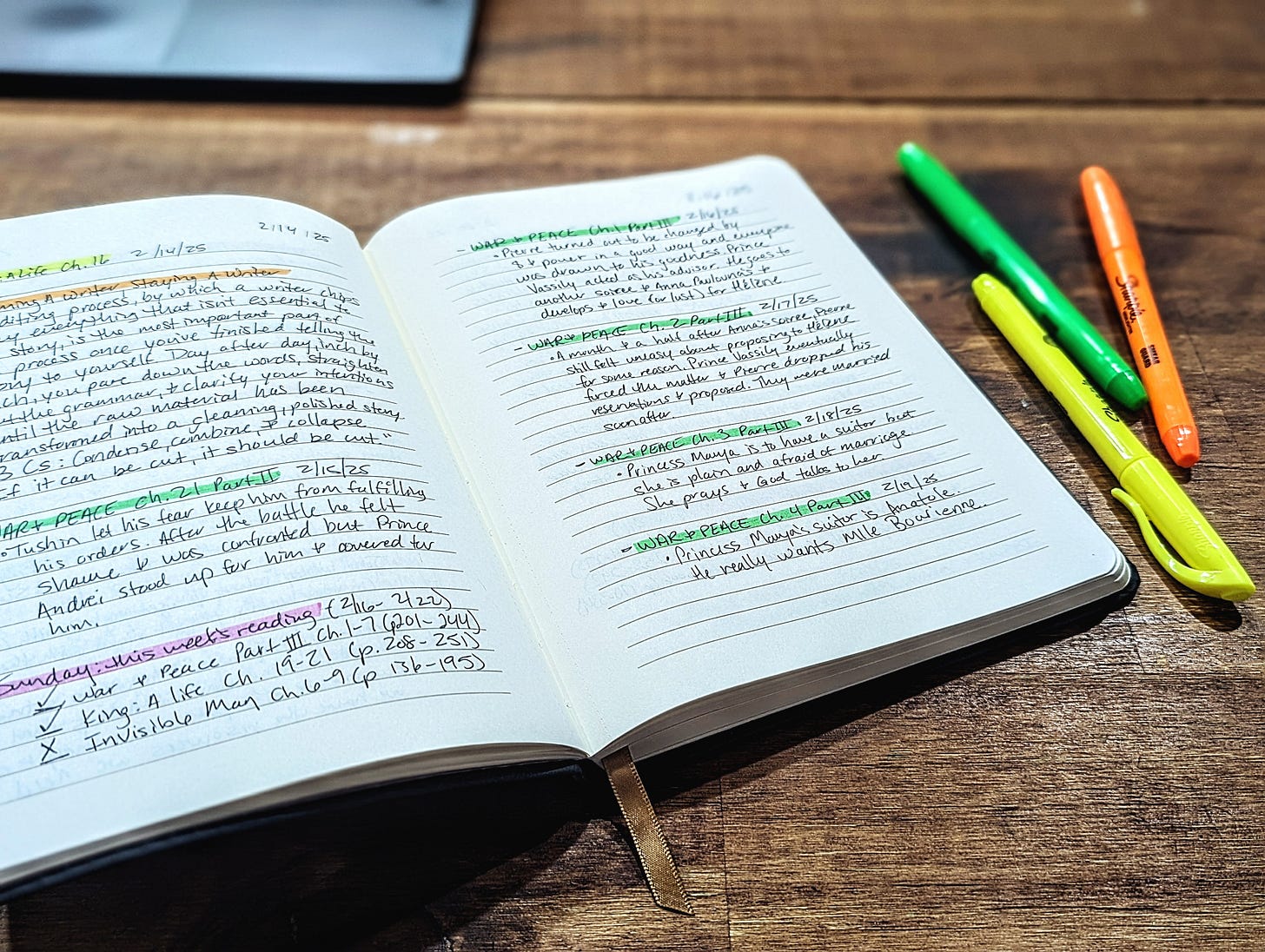How To Remember What You Read
Five simple techniques that have helped me master what I am reading
For years, I would read books and get excited about what I was learning, only to find that I could not recall anything I had just read. For all of the wonder of our minds, it is amazing how little capacity we have for recalling new information and learning. Add in the amount of content we are exposed to through digital media and we have built a recipe for forgetting. The brain is very efficient but one of the limitations of our brains is the ability to sift through a lot of information and assign relevance to each piece of information. If the information is not considered important, the brain dumps it. This is a lifesaver in many instances but can hinder our recall of what we want to learn.
I remember the first time I read through Atomic Habits by James Clear. The book was filled with incredible content on the importance of habits, how to break unhealthy ones, and how to build sustainable ones. After finishing the book, I was ready to put its principles into practice and change my life. The problem was, I couldn’t remember any of the steps of the habits. I could not put them into practice or even tell people what I loved about it because I had lost all of its content. I realized I had a problem with retaining what I had read, so I decided to seek out tips and techniques from readers on ways to improve my retention. Fast forward to today, and I have developed a system that works for me and I retain the majority of what I am reading. In today’s newsletter, I am sharing my tips with you to help you become a better reader and master the books you are reading.
In a previous newsletter, I shared my reading tips that have increased my reading life. Another question that I get most frequently is how to retain more of what you read. My tips on reading were not to convince anyone to read 100 books per year but to share ways that have helped me to read more. A key part of being a lifelong learner is retaining what you are learning and comparing ideas and putting learning into our lives.
Not every book that I read is for learning or retention. I read a lot of books just for leisure, and these tips do not apply to those pleasure books. I choose a certain number of topics/books that I want to read/learn each year and focus on reading those books deliberately.
I am more of a morning person, so I do my serious reading in the mornings. My mind is sharper, and the cognitive load of the day has not worn my, attention. I choose this time to do my more serious reading and learning because my mind can maintain focus in the early morning. I read in the same place every morning to prime my mind for learning. This is non-negotiable time for me.
The evenings are typically filled with lighter or pleasure reading and books that I don’t need to focus on as much. I find reading to be a more positive habit than scrolling mindlessly on my phone or watching YouTube videos. I do those things as well but I try to change my habits by choosing books instead. I also read multiple books at a time. This helps me avoid feeling the dread of picking up a challenging or long book when I am tired after a long day.
Using the tips below has helped me to improve my retention, learning, and allowed me to cover many topics that I am interested in.
Here are my top five tips to help you retain more of what you are reading:
· Underline or highlight key ideas or phrases.
For this tip, I am assuming you own the book. I buy books that I plan to read deeply and study. This helps to build my library and allows me to go back and reference books again in the future. I always read with a pen in hand or a highlighter. On my first read-through of a book, I underline or highlight any key concepts, ideas, characters, or quotes I come across. This helps the reader to be interactive with the text and allows them to quickly review the key concepts after reading. I go back through the chapter and review those key ideas after reading. I have found this extremely helpful in increasing my focus on the book as I am looking for key points to underline.
· Write in books.
Here is an example of how I underline key ideas and write in the margins. I use stars to help key points stand out.
As I am reading through the book and underlining, I will write notes in the margins. Sometimes I write key ideas, questions, if I don’t understand a section or am not sure if I agree or not. These notes are often a single word or a short phrase. For example, when reading Atomic Habits, I wrote Habit Stacking in the margins. As I go back to revisit each section or chapter, these words stick out. This allows me to interact with the text and keeps my mind engaged. If you are borrowing a book or reading a library book, I will write notes in a notebook or on flashcards. Flash cards are ideal with library books because you can stick them in the book at the page you read the idea. For those who like to read digitally or on a Kindle, I keep my notes app open in my phone and will write words or phrases from the chapter in a note that I keep about the book.
· Briefly summarize each section or chapter immediately after you have read it.
In my notebook, I write the date, the book title, the chapter, and a brief recap of what I read. I highlight the books I am reading at one time with different colors.
I keep a notebook that is filled with all of my reading notes for each year. This can be any kind of notebook. I write the date I read a certain chapter or book and I highlight the different books that I am reading each day. This way, I can easily tell which ideas come from which book as they are color-coded. Immediately after finishing each chapter or section of a book, I briefly summarize, in my own words, what that section or chapter was about. I try and keep this short, no more than 1-3 sentences. By putting the ideas in my own words, this allows me to formulate my thoughts and ideas, and I can test myself to see how well I understand the concepts.
· Talk to others or teach someone else.
This is another key tip. I tell someone else about what I am reading and learning. My poor wife has gotten the Cliff Notes on hundreds of books over the years as I talk through ideas with her. This is one of the major reasons I started writing on Substack. She told me that I needed to find my people who enjoyed reading like I do. When I am brainstorming ideas for the newsletter for Read and Think Deeply, many of them come directly from what I am reading/learning at the time. You do not have to publish a newsletter to do this step. Just find someone willing to lend an ear as you work through ideas. This verbal processing allows for greater retention as your mind is forced to recall what you have read and put the pieces together.
· Write reviews or summaries
This is something I have only recently started doing, and I have noticed my retention of books improving. After I finish a book, I either write a review or a summary of the book. This does not have to be some elaborate or well-thought-out summary. Just start the process of putting pen to paper or fingers to keyboard and let your mind work through what you have learned. I try and recall the key plot points, ideas, and quotes from the book. In doing this, I look back at my notes from my notebook and the annotations I have made in the margins. I try and summarize what I have read and ideas I would like to put into my life. If it is a nonfiction book, I try to incorporate one idea into my life.
Bonus tips: Many classic books or deeper non-fiction books are meant to be re-read. Often, these books need to be wrestled with or read through and then revisited at a later date. I also like to listen to podcasts or interviews with the author (especially nonfiction books) after reading the book. Authors will often give you more context or even explain topics better in an interview format than in writing.
Reading deeply and retaining what you have read is a skill that must be practiced and honed. These tips are a good starting point as you develop your system for retention of what you read/learn. I have tried different retention techniques over the years, and have found these to work best for me. At first, these were slower and felt less efficient, but I have gotten faster and better at utilizing these tips with practice. I am now reading more books and retaining more of what I have read, thanks to these tips. And remember, learning is a lifelong process and requires a bit of struggle to improve comprehension and learning.
I am enjoying sharing reading tips with others. What are some other topics or questions about reading you would like me to address in future newsletters?




I'm going to try these! Thank you really well written and insightful
Write reviews! Write a summary paragraph of each chapter then summarize those in a review!
Your Kindle will not only highlight, but also let's you write unlimited marginal notes! You don't need a separate phone app...